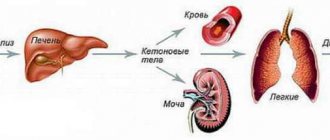Sweet smelling breath from a child may be a sign of diabetes, but you need to understand that this disease is usually accompanied by many other worrying symptoms. Diabetic ketoacidosis is caused by the breakdown of fat for energy because the body cannot use glucose. The breakdown of fat produces chemicals known as ketones, which give baby's sweet breath (some call it fruity or pear-smelling).
Sweet smell from a child’s mouth – when to see a doctor
If such a sweet smell from a child's breath is accompanied by symptoms such as excessive thirst, excessive urination, fatigue, weight loss or gain, diaper rash, cuts and abrasions that will not heal, this could indeed indicate type 1 diabetes. If your baby has all or some of them, of course, it makes sense to consult a doctor - never make a diagnosis based on online articles or the advice of a neighbor. However, sweet breath can be caused by the child's basic hunger or exposure to shampoos and other personal hygiene products. Assess your child's lifestyle. Some children actually feel hungry all the time.
Eliminating bad breath
Remember that children are very vulnerable; you should not offend or push your child away if he suddenly has a problem such as bad breath. Be sensitive, do not make your child confused or embarrassed. Help your child overcome this problem.
So, if a child has an unpleasant odor (however, this also applies to adults), you should not self-medicate and buy advertised oral hygiene products. First, go to the doctors who will be able to establish your diagnosis for the variety of reasons described above and select the correct treatment. Otherwise, you may waste valuable time.
First, visit a pediatrician - he will be able to assess the general condition of the child, then you will need to visit a dentist who will check the teeth and oral cavity. Perhaps, if the second specialist does not find the cause of the unpleasant odor, the pediatrician will advise visiting a gastroenterologist. Only after this will it be possible to analyze the information from all the collected tests and expert opinions, make an accurate diagnosis, and, of course, prescribe the correct adequate treatment.
But many mothers take these steps very rarely, since most often they find the cause of bad breath in a child in his diet. For example, if you cook dishes with garlic or onions, if your baby loves cheese or spicy foods, then it is best to try to limit the consumption of such foods.
Instill hygiene skills from childhood - this will definitely help your child maintain healthy teeth in the future.
Sweet breath and diabetes: is there a scientifically proven connection?
On November 26, 2014, the journal Breath Research reported that Oxford scientists had created a breath test to diagnose type 1 diabetes, which measures the amount of potentially harmful chemicals in the blood that accumulate when insulin levels are low.
These findings link increased levels of acetone in the breath with increased levels of ketones and may predict diabetic ketoacidosis in children, which occurs when a severe lack of insulin means the body cannot use glucose for energy and begins to break down fats instead. Organic compounds called ketones are a byproduct of fat breakdown that remain in the body as acids for a long time.
About a quarter of children diagnosed with type 1 diabetes do not know they have it until they develop ketoacidosis, which can lead to serious health problems. Ketoacidosis is a potentially life-threatening condition that can happen to people with diabetes when blood sugar levels drop so low that the body begins to break down fats for energy.
Acetone, which is the simplest ketone, is one of the byproducts produced during diabetic ketoacidosis and is usually eliminated through breathing. In fact, for over 200 years, acetone has been known to produce a sweet odor in the breath of diabetics.
Acetone smell from child's mouth
Perhaps, only this “aroma” in children requires an immediate response from either parents or doctors who are already savvy on the issue. If you notice a specific pungent odor, even without any other symptoms, immediately begin to eliminate the reasons that caused the increase in acetone.
When appears
The mechanism of accumulation of acetone in the body in children is quite simple. People expend energy every minute, even while sleeping. Its source is glucose, which accumulates in the muscles and liver in the form of glycogen. To provide itself with energy for vital processes, the child’s body begins to extract glucose first from muscles, and then, through complex chemical reactions, from fat deposits. Acetone is a by-product in such processes.
Additional symptoms
Acetonemic syndrome manifests itself individually in different children. Moreover, in the same child, an increase in acetone can occur either explicitly or hidden. But most often this condition is accompanied by vomiting and a rise in temperature. Moreover, acetone can grow both as a result of these processes and be their cause.
The easiest way to determine whether a child has acetone is to use special litmus test strips. They are sold at pharmacies and measure the level of a substance in the urine.
Possible reasons
The following processes and conditions can cause acetone syndrome:
- hysteria or, on the contrary, excessive joy;
- food poisoning;
- viral diseases accompanied by fever;
- sports activity;
- noisy games.
Thus, it is logical that an increase in acetone occurs in children after some large energy expenditure. Typically, this condition haunts children who are skinny and active. This pathology exhausts parents, but usually by the age of 7-9 years, children “outgrow” acetonemic syndrome.
What to do and how to treat?
To eliminate excess acetone in a child’s body, it is enough to replenish the glucose supply. To do this, if the baby does not feel sick, you can give him glucose tablets or even candy. Sweet tea is well suited for these purposes.
If a child starts vomiting, it is quite difficult to stop it with acetone syndrome. Often these attempts end with the installation of an IV in the hospital. Experienced parents, in order to avoid a trip to the doctor, give their baby a teaspoon of sweet tea every couple of minutes. When the level of acetone drops so much that the child begins to drink liquid freely, its amount is increased, since the harmful substance leaves the body only with urine.
After the crisis has passed, the baby should be kept on a gentle diet for some time.
Significant causes of sweet breath from a child
- Diabetic ketoacidosis. Symptoms of diabetic ketoacidosis include dry mouth, excessive thirst, urination, and more.
You need to understand that a sweet (fruity) odor from the mouth can be assessed by parents very subjectively and conditionally - after all, the odor can be accompanied by such conditions as a coating on the tongue, a metallic taste in the mouth, the smell of bitter almonds, a black tarry coating on the tongue, pus, cracks in the mouth. corner of the mouth, pain, discomfort, excessive salivation, difficulty breathing and so on. Remember that contacting your local pediatrician as soon as possible will allow you not to guess at the tea leaves, but to get a professional assessment of your child’s health.
Author of the article : Andrey Selin, Moscow Medicine Portal©
Disclaimer : The information provided in this article about baby's sweet breath is intended for informational purposes only and is not intended to be a substitute for consultation with a healthcare professional.
A wide variety of odors from the oral cavity accompany people throughout their lives. When a sweet smell from the mouth appears for the first time, a person wonders why it appears. Most often, many people think that it occurs due to the fact that sweets were consumed beforehand. In fact, this is not so; such an aroma may arise due to some kind of disease.
There are doctors who can easily identify diseases by smell. In ancient times, doctors had a very sensitive sense of smell. In a hospital setting, it is very difficult to identify an illness just by smell. After all, it smells of various medicines and bleach. It is much easier to do this in a home atmosphere, so you can call a doctor at home. Despite the fact that sweets are very tasty food, such a smell indicates that there is some serious pathology.
Sweet breath is a sign of a serious illness
Your child has bad breath - reasons
Let us hasten to reassure readers: the answer to the question of why a child has bad breath is in most cases associated with the condition of the oral cavity, primarily the teeth and gums (as well as the salivary glands) of the baby. The second most common cause of stench is diseases of the ENT organs (primarily the nasopharynx). And only in third place are diseases of internal organs. In addition to the banal consumption of certain foods (such as garlic, onions, some types of cheese), here are the most important and most common causes of bad breath in children.

Poor oral hygiene is the most common cause of halitosis.
- Incorrect care . The condition of the oral cavity should be monitored from birth. It is necessary to clean your teeth of plaque immediately after they erupt. If the baby does not yet know how to spit out toothpaste or refuses to put a brush in his mouth, you can use a special finger brush and offer the child to drink water (or better yet, chamomile tea) after each meal. The fact is that a large accumulation and proliferation of microorganisms that feed on leftover food, in addition to amber, provokes the development of caries, gum problems, and is a constant source of infection in the child’s body. And this may lead to other, more serious health problems. The metallic smell of iron is felt during periodontal disease; This disease is accompanied by discomfort and bleeding gums.
- Changes in the microflora of the oral cavity, dysbacteriosis . This point is closely related to the previous one. With chronic problems with teeth and gums, frequent diseases of the ENT organs, with bronchitis and disturbances in the functioning of the gastrointestinal tract, the composition of microorganisms inhabiting the child’s oral cavity changes dramatically. Harmful bacteria (including the so-called putrefactive bacteria) multiply at lightning speed, displacing populations of beneficial ones and changing the smell of your mouth for the worse. That is why children with chronic diseases of the nasopharynx, as well as multiple caries, often smell sweetish.
- Dry mouth, problems with the functioning of the salivary glands . Saliva plays an important barrier and bactericidal function. When the salivary glands do not produce enough secretion, the mucous membranes dry out and harmful microorganisms multiply at double speed. The child begins to smell bad, caries develops, and areas of the mucous membrane may become inflamed. In this case, a decrease in the amount of salivation can occur due to various reasons. These include psycho-emotional disorders, stress in the child, and some diseases that lead to dehydration of the body, and the use of medications.
- Problems with the nose . Children suffering from chronic diseases of the upper respiratory tract (rhinitis, sinusitis, sinusitis) clearly notice bad breath. Its appearance is associated with drying out of the mucous membranes of the oral cavity due to difficulty in nasal breathing. The barrier and protective function of the nasopharynx practically disappears, microorganisms quickly multiply in the mouth, including putrefactive bacteria, the waste products of which provide a terrible smell of rot (some say rotten garlic) in the child. Flowing down the back wall of the throat, the snot ends up on the root of the tongue, a place densely populated with bacteria. When they process the mucus, sulfur compounds are released, guaranteeing a pungent amber.
- Throat problems . Babies suffering from chronic tonsillitis and adenoiditis smell like pus. In the first case, amber is guaranteed by pus and plaque on the tonsils. In the second, the enlarged adenoids block the nasal passages, as a result of which the child is forced to breathe through the mouth, which leads to dry mouth and the proliferation of microorganisms there.
- Problems with the bronchi and lungs . With the expansion of the bronchi, as well as due to deterioration of air conductivity in the lungs (most often due to infection), the child begins to cough violently, coughing up sputum (mucus) with an unpleasant odor. Amber also naturally emanates from his mouth. If there is pus in the lungs of a small patient, the sputum will be more viscous, with a noticeable putrefactive tint. This is an extremely dangerous condition that requires emergency hospitalization.
- Problems with the gastrointestinal tract . By the nature of the smell, you can independently determine the baby’s illness. Thus, a sour, sometimes bitter odor comes from a child with severe motor disorders, reflux esophagitis, inflammatory processes in the gastrointestinal tract (primarily gastritis). It has been noticed that if there are problems with the liver (primarily with hepatitis), the child may smell like liver and rotten meat. If the gallbladder is affected, your breath will smell like bile. A sour odor from the mouth of a newborn is almost constantly noticeable during regurgitation and vomiting syndrome.
- Dysbacteriosis . Bad breath is observed in children with dysbacteriosis. If, in addition to the disgusting amber, the baby is plagued by frequent diarrhea or, on the contrary, constipation, he eats poorly and has lost activity, the number of pathogenic bacteria in his body significantly exceeds the number of useful ones, and this imbalance should be eliminated.
- Parasites . Bad breath in infants and older children can be caused by helminths. For example, with enterobiasis, a child may even smell like feces. This is explained by reduced peristalsis and stagnation of intestinal contents.
- Other diseases . The smell of ammonia can come from children with pyelonephritis and other kidney diseases. Children with diabetes mellitus smell of acetone. Acetonemic syndrome occurs in children against the background of stress and serious emotional upheaval. Babies infected with the bacterium Klebsiella smell of iodine, are poisoned by iodine vapor, or have some disturbances in the functioning of the endocrine system.
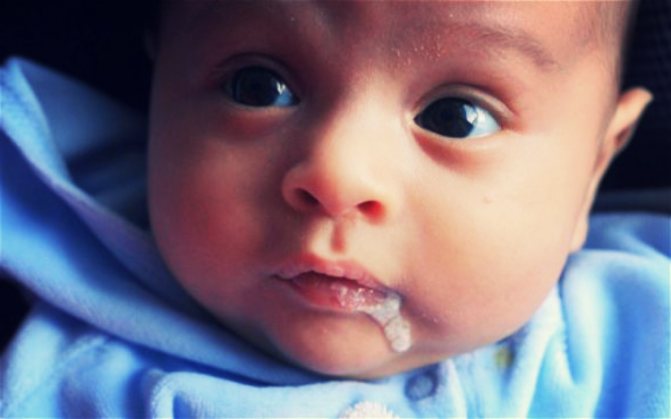
Spitting syndrome is a common cause of sour smell in babies.
Why does the sweet smell appear?
Sweetish breath does not mean anything good, so why does it occur? In this case, several reasons can be identified, some can be very serious, while others do not pose any danger. But in order to find out why it appeared, you need to go to the hospital. The main causes of unpleasant odor:
- Most often, a similar aroma appears in people who are on a diet. When a person does not receive all the necessary vitamins, his body begins to accumulate fat. After which it begins to decompose and give off a sweetish aroma.
- The most dangerous disease is diabetes mellitus, which causes a fruity smell from the mouth. Some people confuse this scent with acetone. It smells because diabetics have very little glucose in their blood and it does not enter the cells well. In turn, the cells begin to destroy fats. This is what causes your mouth to smell.

If there is a sweet smell, you need to check your sugar level
- A sweet smell can also occur in those people who have problems with the kidneys and liver.
- This aroma is also observed in patients with infection, most often with diphtheria.
- If you have lung problems, your mouth will smell like rotten fruit. A similar aroma also occurs with bronchitis.
- Also, problems with the gastrointestinal tract can cause sweet breath. But most often it appears during heartburn.
- Severe stress and bad habits can also cause such a taste and, accordingly, smell.
- An unpleasant odor can develop for many reasons, some of which have not even been identified yet. Therefore, if such an aroma appears, you should go to the hospital. The doctor will prescribe a series of tests and either make a diagnosis or refute it.
How is cytomegalovis linked to sweet breath?
A sweet smell indicates that there is some kind of virus in the body. If there is also a coating on the tongue, then its name is Epstein-Barr. This disease affects the mucous membrane. The person begins to complain of a bad smell and dry mouth.
An unpleasant odor can also bother a child who has become infected with cytomegalovirus.
The baby may develop a yellow plaque that covers the entire mouth. There is no specific reason for the appearance of a sweet smell, but experts suggest that it occurs due to:
- lack of fluid in the body;
- taking different medications;
- use of antidepressants.
Doctors believe that the smell of rotten fruit appears due to impaired carbohydrate metabolism. The aroma may appear in those who are overweight, which is 30% higher than normal. Because of this, cells cannot build normally and insulin cannot be absorbed. The oral cavity dries out, thereby preventing blood from circulating as it should.

The smell at temperature is also sweetish
During this disease, not only a fruity smell may appear, but also the smell of acetone. Most often this does not happen immediately after eating, but after some time. In children, this aroma occurs when there is a serious illness or high temperature.
Is a coating on the tongue and bad breath in a child normal or a disease?
Plaque itself, especially after a night or long sleep, is not a sign of pathology. This is a natural process that occurs in the oral cavity of all people, when saliva production is not as intense as during periods of activity.
In what cases should you not be afraid of symptoms?

When is plaque with a slight breath odor in a child considered normal? First of all, you need to pay attention to those parts of the organ that are covered with a film. If the body of the tongue and its usual color can be seen through them, and the smell does not differ from usual (for example, after eating or sleeping), then everything is in order. Another good sign: you can get rid of the formed film quickly, and it does not appear again without obvious reasons.
Often we are talking about a transparent film around the tongue and in the far corners of the mouth, which appears in the child after sleep. This phenomenon can be eliminated by simple hygiene measures - regular cleansing of the mouth.
A plaque with a milky tint occurs in infants after feeding with milk or nutritional formulas. Along with it, the child gets a slight smell of milk or a sweet and sour amber.
A light, light coating may appear in the mouth of a child who does not observe hygiene measures and also often eats flour and sweet foods. In such cases, a heavy odor does not appear from the mouth.
When is the color of plaque on a child’s tongue considered a sign of pathology?
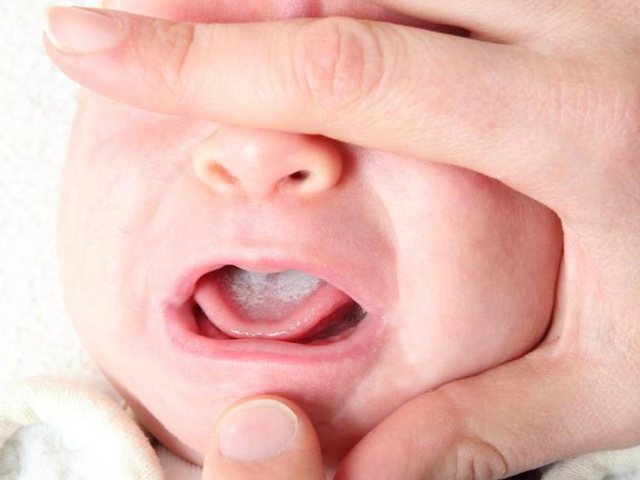
In what cases is a layer formed on the tongue a symptom ? First you need to pay attention to the location of the plaque - this can tell you in which part of the body the pathological processes are occurring. It is important to take into account its density and color, which vary depending on the problem, and also take into account the severity of the odor coming from the mouth.
Most often, parents complain to pediatricians about a dense white coating on the child's tongue and bad breath . Others report a yellow coating on the tongue and bad breath regularly appearing in children.
Experts say that these are not the only “shades of disease.” Films on the tongue also come in grey, brown, orange, green, blue and even black . Each of these unusual shades for the oral cavity means a particular disease:
- A gray layer on the tongue indicates diphtheria or dehydration;
- Brown is kidney disease, gallbladder disease or vitamin B deficiency;
- An orange coating of film on a child’s tongue indicates serious stomach problems;
- A green coating on the tongue and bad breath indicate pathologies of the gallbladder;
- A bluish film in the mouth indicates serious disturbances in the functioning of the cardiovascular system or diseases of the nervous system, including hemorrhages;
- Black plaque can indicate bacterial tonsillitis, problems with the adrenal glands, cholera and diabetes.
However, most often infants and older children develop a yellow or white coating on the tongue and bad breath . The reasons for this phenomenon are worth considering in more detail.
Why do children develop a white film on their tongue?
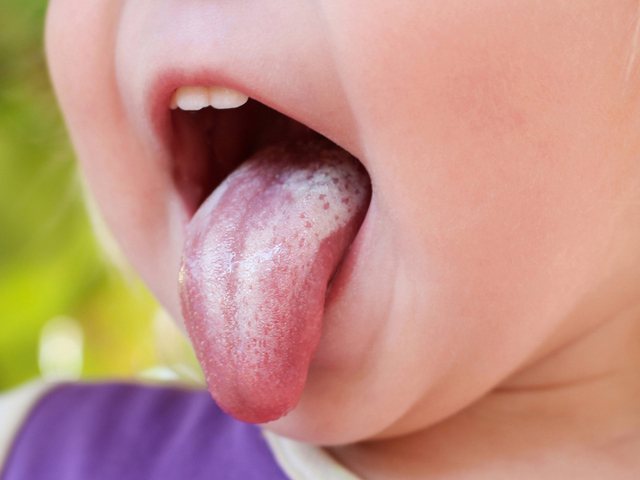
If parents notice a white coating on the child’s tongue and bad breath, then they should immediately consult a doctor, since usually these two symptoms do not appear regularly just like that.
- Dental problems - foreign odor from the mouth and a white coating on the tongue may appear at the first signs of caries and gum disease, which cannot always be seen in a child on his own;
- Thrush or candidal stomatitis - in this case, the child has a white coating on his tongue and a smell from the mouth that resembles sour milk. A distinctive feature is abundant cheesy white discharge. The cause of the disease may be the use of antibiotics, non-compliance with hygiene standards or metabolic failures;
- Bacterial stomatitis is a disease that manifests itself in the form of a white-gray coating on the tongue and other parts of the oral cavity, and is accompanied by an unpleasant odor from the mouth, reminiscent of putrefactive processes. Develops when infection gets into wounds in the oral cavity;
- Herpes virus - this disease manifests itself in children starting from the age of two, when blisters form in the mouth and redness appears. White coating on the tongue and bad breath occur when infection gets into the wounds;
- Diseases of the gastrointestinal tract - often we are talking about an acute or chronic attack of gastritis, stomach ulcers, poisoning or a foreign object in these organs. In addition to a white-gray coating on the tongue, an extremely unpleasant ammonia, putrid or rotten odor may emanate from the child’s mouth;
- Diabetes mellitus - a thick film on the child’s tongue will give off the smell of acetone, which constantly accompanies patients suffering from this disease. In addition, the patient’s behavior may indicate pathology: general weakness and fatigue, sweating, lack of appetite, or an abnormal feeling of hunger;
- Acute infectious diseases - ARVI, measles and scarlet fever can indicate to parents the need to urgently seek qualified help due to plaque and high fever, as well as weakness, poor appetite, in some cases, painful sensations in the throat, and rash.
Causes of yellow plaque in a child’s mouth
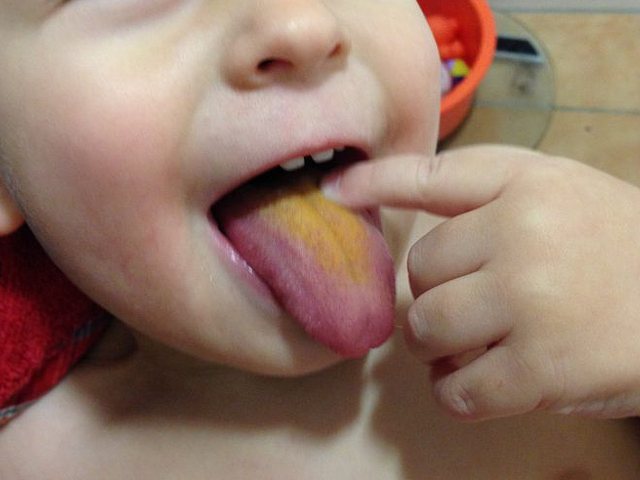
The yellow coating on the tongue has a stronger unpleasant odor with a putrefactive tint.
Yellow coating on the tongue and bad breath - causes:
- Advanced dental diseases - deep caries provokes the mentioned symptoms;
- Chronic or acute diseases of the gastrointestinal tract and pancreas - often yellow plaque and bad breath in a child appear when the valve connecting the stomach and esophagus is not functioning properly. Pancreatitis can also cause the formation of a yellow-white film on the base of the tongue;
- Food poisoning and prolonged antibiotic therapy are also accompanied by the appearance of unpleasant plaque and severe odor from the child’s mouth;
- Diphtheria and acute tonsillitis - these infectious diseases manifest themselves in children as yellow-white stains on the tongue, fever, bad breath, nausea and inflamed tonsils.
Bad habits and sweet smell
When a person drinks a large amount of alcohol, a smell of fumes appears. But for this to happen a certain period of time must pass. In women this process occurs much more slowly than in men. About 70% of the alcohol comes out along with the unpleasant odor.
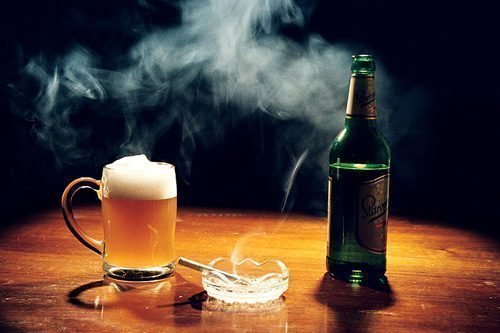
Alcohol and smoking cause sweet smell
After some time, a hangover sets in, and the person begins to experience headaches and dry mouth. Against this background, a fruity aroma appears from the mouth. This happens because alcohol dehydrates the body and in order to get rid of these symptoms, you need to drink a lot of liquid. A simply unbearable smell occurs when drinking whiskey and cognac.
Alcohol simply depletes and dehydrates your body.
And he reacts to this with an unpleasant smell. Alcohol is a toxic substance and when it enters the body, it leaves these toxins there. Therefore, the person experiences nausea and dizziness. This has a negative impact on those who drink soda with a hangover. It’s better to drink plain water, it will be more beneficial.
People who smoke often smell like rotten fruit on their breath, and the smell becomes stronger after eating. Plaque gradually appears on the teeth, which contains very dangerous substances. This is what causes this unpleasant odor.
In order to get rid of it, you just need to give up the addiction, because it affects not only you, but also those around you. It is worth remembering that if you have a sweetish, cloying odor from your mouth, you should immediately go to the hospital. After all, most often this is a symptom of some serious disease.
What actions to take if a sweet smell appears?
If an adult has bad breath, he or she first needs to assess the general state of his or her health. If nothing bothers you, then there is a possibility that there is nothing serious in the body. Those people who are constantly on diets may not worry about the appearance of aroma. Just in order to eliminate it, you need to start eating normally and not exhaust your body. There are many ways to lose weight, and the main thing is the right diet. Therefore, you should not give up absolutely any food.
If a person has recently experienced a stressful situation, then the smell may arise because of this. Just calm down and it will go away on its own.
If this does not work out, then buy sedatives or consult a psychologist. In this case, you just need to eliminate the stress, and the sweet smell will disappear on its own. If the aroma does not go away, then you should go to the hospital for examination.

Consultation with a doctor if you have a sweet smell is mandatory.
First, see a therapist and tell him what's bothering you. After which he will refer you to another specialist or for tests. The first thing to do is donate blood for sugar. Such an analysis will help determine the state of the pancreas. If the diagnosis is confirmed, treatment will be prescribed.
The appearance of a fruity aroma may occur due to dental problems. The dental office is worth a visit. In general, this should be done at least once a year. The sweet smell appears due to the fact that there is an infectious disease in the body. It may be that this disease is in the oral cavity.
People who are prone to diseases such as periodontitis, periodontal disease and others constantly need to go to the dentist. It is advisable to go to a specialist such as an endocrinologist. Share your concerns with him. He will refer you for examinations and find out the cause.
You should also take care of proper nutrition and try to eat less junk food. This will allow the digestive system to function normally. In general, our health depends on proper nutrition.
You need to regularly brush your teeth and take care of your oral cavity. After every meal you should at least rinse your mouth.
If this is not possible, then use chewing gum that does not contain sugar. This will remove food debris and freshen your breath.
Home Remedies, how to get rid of and help your child
Oral health is key. The best thing to do is to produce more saliva and reduce bacterial growth. Take the following steps to deal with your baby's bad breath (1):
Teach your child to brush their teeth well to fight bacteria. Brushing your teeth with a soft toothbrush after every meal will remove food stuck in your teeth and prevent tooth decay. Keep your baby's tongue clean with gentle cleansers. Encourage your baby to drink more water. This helps in increasing saliva production. Use non-abrasive toothpaste. Use fluoride toothpaste approved by the Dental Association. Floss your teeth daily to remove odor-causing food particles from your teeth. To effectively remove debris and plaque, use a new toothbrush every three months. Wash your baby's hands often with soap. If your baby is a thumb sucker, wash toys and other objects frequently. Sterilize their pacifier if your baby still uses one. Visit the dentist as soon as your baby is 12 months old. Regular dental checkups can help prevent bad breath associated with oral hygiene.
Do not use mouthwash on your baby. Your child may have difficulty spitting and waving their hand. Moreover, mouthwashes only solve the underlying problem. Many mouth rinses use alcohol, which is just a masking agent. They only make bad breath worse, causing dry mouth. However, you may want to check with your dentist to see if there are any medicated mouthwashes that can be used for babies.
How to get rid of sweet smell
Once the cause of such a smell is determined, it will be easier to get rid of it. To speed up the process of getting rid of this unpleasant symptom, you can take some measures. If desired, you can simply disguise it. To make the unpleasant odor disappear, you need to do the following:
- It is good to brush your teeth and the entire oral cavity in general. To do this, you can use special pastes or rinses.
- Try to rest as much as possible. Stay outdoors more often, play sports. The main thing is proper and restful sleep. This measure should be used if aroma appears due to stress.
- Introduce citrus fruits and more spices into your diet, but not spicy ones. They do not allow you to get rid of the smell, but to mask it.
Why does a child's mouth smell bad?
The first step towards solving a problem is identifying its cause and aggravating factors.
Bad breath in a child occurs for the following reasons:
- lack of hygiene when parents do not clean the tongue, gums, cheeks and palate;
- pathologies of the ENT organs (tonsillitis, laryngitis);
- impaired salivation, that is, insufficient washing of the mouth with saliva;
- diseases of the stomach and intestines, when frequent regurgitation occurs;
- caries of baby teeth;
- inflammation of the mucous membrane (stomatitis and gingivitis).
Each factor must be considered separately, and together with the dentist, find out why the mouth smells, because the causes must be eliminated first, which already solves the problem by 99%. You also need to pay attention to age, because a month-old and a one-year-old baby smell differently, and each period of life has its own factors that provoke halitosis.
Psychological factor of the disease
Older children may experience a disorder called halitophobia. This is a psychological problem that gives the perception of bad breath when in fact there is no bad breath. Halitophobia can develop in a child who has received psychological trauma, having once taken a remark about bad breath too painfully. This is a serious problem that needs to be addressed to a child psychologist.
Doctor Komarovsky's opinion on bad breath in a child
According to the doctor, an unpleasant odor always has a cause. It is very important to correctly diagnose the cause of the development of the pathology, which should be carried out by a qualified doctor.
E.O. Komarovsky does not recommend diagnosing your baby yourself or self-medicating. In his opinion, the smell of ammonia, urine, feces, iodine and rot are considered especially dangerous.
If halitosis is accompanied by a high temperature, you must immediately contact an ambulance to avoid the rapid development of an inflammatory or infectious process in the digestive system.
Ultimately, we can conclude that bad breath is a very dangerous symptom that requires detailed analysis in order to accurately exclude the possible development of diseases.
Symptoms
Halitosis is a symptom, and therefore other manifestations of the underlying disease will be observed along with it. They can be dental or general.
Unpleasant odor and
accompanying symptoms:
- In case of gum pathologies
, the mucous membrane becomes inflamed due to the accumulation of plaque and pathogens, the waste products of which give off an unpleasant odor. - With hyposalivation or dry mucous syndrome
, an insufficient amount of saliva is produced, which causes plaque to accumulate faster, in addition, this becomes a factor in dental caries. This disorder may be a consequence of diabetes mellitus, vitamin deficiency, taking medications, or undergoing a course of radiation therapy. - If oral care is poor and you have braces and dentures
, food particles accumulate on the structures and begin to rot, causing a corresponding odor. - In case of caries and other dental diseases, this concerns tooth decay, destruction of hard tissues, because bacteria accumulate in carious cavities, which will be a factor in permanent halitosis.
If everything is fine with the child’s teeth and gums, you need to pay attention to the symptoms in the throat, and when the mouth stinks due to inflammation, children should be treated not only by a dentist, but also by an otolaryngologist.
Cause for concern
Every parent begins to worry about the child’s health after noticing a problem such as halitosis. The first thing to do in this case is to consult a dentist. There are many reasons for this phenomenon, and each is a cause for concern.
According to Komarovsky, unpleasant aromas from babies are a consequence of the predominance of pathogenic microflora over healthy ones, when bacteria become the “masters of the situation.”
Smell of iodine
The smell of iodine emanating from a child may indicate diseases of the endocrine system, so you should definitely contact an endocrinologist. This phenomenon most often indicates an excess of iodine in the body. This can happen after taking medications with this substance, a long stay at sea and in the presence of thyroid pathologies.
Treatment
You can get rid of an unpleasant odor while treating the underlying disease. What kind of therapy will be depends on the specific case, but there are general recommendations for parents that will help speed up the recovery process.
What to do to eliminate bad breath in a child:
- every morning and evening, clean the child’s mouth using a soft cloth soaked in water;
- when there are baby teeth, clean them with a special children’s brush with a small head;
- when the child already understands that he needs to spit, start using toothpaste and mouthwash;
- Give your child to chew fruits and vegetables every day, which will help cleanse the teeth;
- remove from the diet or minimize the consumption of sweets, especially sugar, it is better to replace it with honey;
- Give your child more fluid, and it should be pure water or milk, not sweet soda.
If test results exclude any problems with internal organs, treatment of halitosis comes down to following the rules of oral hygiene.
Important! The smell of acetone is especially dangerous. As soon as it starts to emanate from the baby, you need to call an ambulance or take him to the hospital yourself.
What to do if your child has bad breath
What measures should be taken if an unusual odor appears from a child’s mouth:
- Examine the baby's mouth; perhaps the cause is food debris stuck between the teeth. In this case, it is enough to remove them and clean them.
- Take your child to the dentist.
- Visit other doctors to whom the dentist will refer you.
- Follow the treatment measures prescribed by your doctor.
- In the future, visit your dentist regularly for preventive examinations.
If your child produces little saliva, you can give him water with lemon. If your nose is blocked, rinse it with saline solution.
Eating berries and fruits

A good addition to the above methods of combating bad breath in children would be to eat fresh foods rich in liquid and acids. We are talking about apples, carrots, cucumbers, celery. They act like a toothbrush, removing particles of rotting food from the oral cavity that get stuck between the teeth.
Eating berries will help eliminate the problem. Cranberries are ideal. It is useful to drink tea made from dried rose hips from time to time. You can bet on strawberry infusion. It is enough to brew a few tablespoons of these berries in boiled water. The child should be offered the healing composition a quarter glass 2-3 times a day.
Preventive measures
How to prevent halitosis in a child:
- constantly monitor the condition of teeth and gums by examining the oral cavity in good lighting;
- control whether the child brushes his teeth correctly, pointing out mistakes and showing by example;
- use age-appropriate toothbrushes and toothpastes;
- if you wear braces or other structures, you need to use a full set of care products;
- monitor the child’s nutrition, give more fresh vegetables and fruits;
- store the baby brush separately from others and in a special case to prevent bacteria from getting on it.
